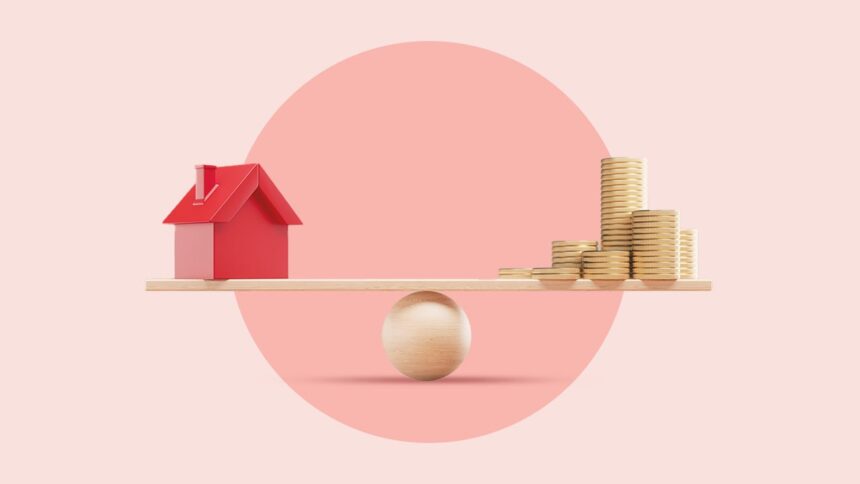
Photo by Getty Images. Illustrations by bankrate
What is a biweekly mortgage payment?
Every other weekly mortgage payments include making half of your monthly payments every two weeks, rather than paying the full amount once a month. This effectively amounts to 26 biweekly payments per year, with additional payments applied to the principal balance of the loan, helping you repay the mortgage and saving interest, as long as you check with the lender or servicer for a total of 13 monthly payments, not 12 but 13 instead of 12, additional payments apply to the loan principal balance, helping you repay the mortgage and saving interest.
How do biweekly mortgage payments work?
Every other week’s mortgage payment means you’ll pay half the monthly payments in half every other week instead of making the full payment once a month. With 52 weeks a year, this means you make half the payment of 26 or 13 full payments per year.
Examples of biweekly mortgage payments
Let’s say you bought a $350,000 home that fell 30%, and you provided 7% funding on a 30-year fixed-rate mortgage. Your first mortgage payment would look something like this:
| Monthly payment | Main | interest |
|---|---|---|
| $2,095 | $257.50 | $1,837.50 |
To make this a biweekly payment, you’ll just cut your monthly payment of $2,095 every two weeks and pay $1,047.50.
At that rate, by the end of the year, you’ll be paying $27,235, $2,095 more than what you paid if you paid once a month. However, that extra payment is headed entirely towards the principal. Saves a lot of interest and adds much faster payoffs.
| Payment Frequency | Total interest | Payoff time |
|---|---|---|
| Monthly payment | $439,453 | 30 years |
| Every other week payment | $327,470 | 23 years |
You can calculate your number using the biweekly mortgage payment calculator.
Pros and cons of biweekly mortgage payments
An alternative to biweekly mortgage payments
If paying a biweekly mortgage is not an option for you, but you still want to pay off your mortgage faster, consider these alternatives.
- You can combine your monthly payments into the nearest 100,000 or 100,000, and pay that amount.
- Use bonuses, tax refunds, or other rewinds to make additional payments with lump sum payments.
- Additional payments are made at any time of the year.
You can also opt to pay a bimonthly mortgage rather than a biweekly payment. After two months, you will be paying half of your mortgage payments 24 times a year on two scheduled days of each month (1st and 15th). Additional monthly payments will help you pay off your mortgage faster, but the savings on a bi-monthly plan are slightly smaller than your bi-weekly plan, as one month is generally longer than four weeks (28 days).
Finally, you can also divide your monthly payment by 12 and park that amount in your savings account each month. Then, at the end of the year, the accumulated amount can be sent to the lender as an extra payment to the principal alone.
How to set up a biweekly mortgage payment plan
Contact your mortgage servicer (this may or may not be your lender – here’s how to check). If the lender allows biweekly payments and applies additional payments directly to the principal, you can submit half of your mortgage payments every two weeks. For example, if your monthly payment is $2,000, you could send $1,000 every other week.
Check it out so that your biweekly mortgage payment plan works the way you intended:
- The lender or servicer will allow you to make biweekly mortgage payments.
- Additional payments apply to the loan principal.
- You will not be charged a prepayment penalty or fee to set up or maintain your payment plan.
- Interest rates remain the same (unless there is an adjustable loan).
Finally, monthly total mortgage payments often include property taxes and homeowner premiums. Ask your lender if these payments inflate the escrow cushion.
Things to consider before switching to biweekly mortgage payments
- What does my savings account look like? Paying back your debts faster would feel good, but you shouldn’t sacrifice the emergency fund. In short, if your savings need caution, don’t be too thin to make biweekly payments.
- What other debts would I pay? If you are paying back your car, student loan or credit card, consider the interest rates that come with them. It may be better to reduce other debts to zero before transferring your attention to your mortgage.
- What is my interest rate? The higher your mortgage rate, the more you save on your biweekly payments.
- How long will you be staying at home? If your home is not your eternal home and you have other financial goals you are working on, paying off your mortgage early may not be your number one priority.
- Is it better to invest extra cash? Should I save money by eliminating debt, or should I make money by finding good investment opportunities? That’s a big question that doesn’t necessarily have a simple answer. Those with decent risk tolerance, and the horizon for many years, may choose to put money into the stock market. Meanwhile, removing mortgage debt can free up your budget and reduce future debt costs.
Every other weekly mortgage payment FAQ
Additional Reports by Taylor Freitas










